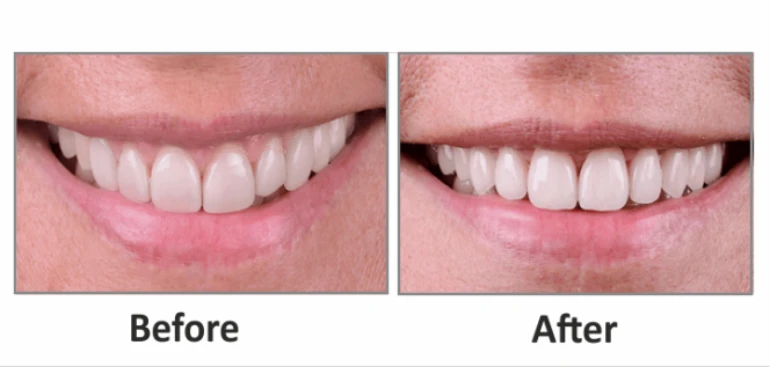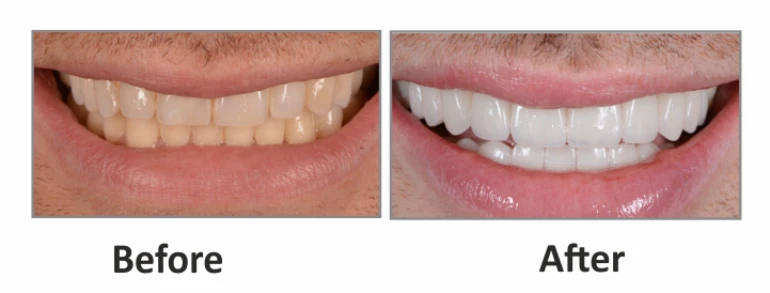The act of whitening teeth is a great way to boost self-esteem. However, some may find the process painful, which is an issue for those with sensitive teeth. Sensitivity is experienced due to the loss of enamel or recession of the gums leading to the dentin peeking through.
Thus, making a selection of the appropriate whitening method is important to prevent irritation while also getting good results. There is a range of products and treatments available that specifically address the needs of those with sensitive teeth, making it easy for everyone to whiten their teeth without the added discomfort. However, consulting an experienced dentist in Frisco may help you know the most appropriate whitening method according to your oral health.
Understanding Teeth Sensitivity and whitening
Teeth sensitivity, also known as dentin hypersensitivity, refers to dental issues causing sharp pain and discomfort in one or more teeth. Some activities that cause excessive pain are brushing your teeth, drinking, and eating. One of the fundamental reasons that cause sensitive teeth is tooth enamel that becomes worn out and the roots of the teeth also become exposed.
Some causes of teeth sensitivity are:
- Worn-down tooth enamel
- Gum disease
- Cavities
- Cracked teeth
- Usage of teeth whiteners
- Eating highly acidic foods containing high sugar content
Certain stimuli that can trigger teeth sensitivity are as follows:
- Sweet and acidic foods
- Hot and cold temperatures
- Brushing
- Flossing
- Breathing in cold air
You can prevent teeth sensitivity by regular dental check-ups and eating tooth-friendly foods rich in calcium.
Teeth whitening refers to a dental process that will help to lighten the color of your teeth. You can choose teeth whitening at home or at a dental office. However, one must always consider consulting a dentist before choosing to do teeth whitening themselves. Now, let’s find out the criteria to choose a teeth-whitening product and how to minimize teeth sensitivity.

Criteria For Selecting The Best Teeth Whitening Product For Sensitive Teeth
To select the right teeth whitener, some of the things you must look for are as follows:
- One of the most essential things to look for is that your whitening product must have the American Dental Association (ADA) Seal of Acceptance.
- The ADA acceptance will ensure that the teeth whitening product you are using is tested for efficacy and safety.
- You need to look for products having lower peroxide concentrations, such as products including desensitizing ingredients such as fluoride or potassium nitrate.
- Select a whitening product that adds to your comfort and check for reviews of people who suggest minimal side effects.
- The product must be cost-effective and easy to use.
- Lastly, you may seek help from a dentist who will help in determining which whitening product is useful for your smile.
Concentration Bleaching Agents
Dental whitening is also known as dental bleaching, which is a common procedure in dentistry. Fundamentally, there are two methods for teeth such as gel bleaching and laser bleaching.
Bleaching mechanisms include free radicals and the breaking of pigment, whereas whitening can be done through abrasive action. The use of tooth-bleaching agents can be done by a dentist or even at home.
Internal bleaching agents are:
- Office bleach, in which there is a mixture of 30% to 35% hydrogen peroxide and sodium perborate that is heated to accelerate the overall procedure of bleaching.
- Walking bleach is a mixture of hydrogen peroxide and sodium perborate. The mixture is sealed to the teeth for at least 2 to 3 days.
Extrinsic bleaching agents are:
- Power bleaches have high concentrations of hydrogen peroxide. However, they must be used with caution as they are caustic.
- Assisted bleaching has high concentrations of carbamide peroxide.
Top Recommended Teeth Whitening Solutions For Sensitive Teeth
Some teeth-whitening products that help to minimize sensitivity are as follows:
- Use desensitizing toothpaste: Several types of toothpaste can be used for sensitive teeth. Use Nu Skin AP 24 toothpaste, Crest 3D Whitestrips dental whitening kit, and Sensodyne extra whitening toothpaste.
- Maintain good oral hygiene: You need to continue to do proper brushing and other flossing techniques that will thoroughly clean all parts of your mouth and teeth.
- Use a soft-bristled toothbrush: Try to use a toothbrush that has less abrasion to the tooth surface and causes less irritation to your gums.
- Watch what you eat: Keep using consumption of foods that are highly acidic as it will help to dissolve tooth enamel. It may also make the sensitivity severe.
- Use fluoridated dental products: Use the fluoridated mouth rinse for daily use as it can help to decrease sensitivity. You may ask your dentist for further help.
- Avoid teeth grinding: If you clench or grind your teeth, try to use a mouth guard during the night.
- See your dentist regularly: Try to see your dentist regularly for cleanings, fluoride treatments, and routine examinations that will help to maintain oral hygiene.

Maintaining Your White Smile Without Increasing Sensitivity
To maintain your white smile without increasing sensitivity, you must follow some tips as follows:
- Use desensitizing toothpaste: Use toothpaste which has such a composition that blocks nerve pathways before and after the teeth-whitening procedure.
- Avoid hot and cold foods and drinks: After teeth whitening treatment, you need to avoid consuming hot or cold foods and drinks.
- Avoid acidic foods and drinks: Try to limit consumption of acidic foods, citrus fruits, and drinks such as sodas.
- Brush gently: Try to use a toothbrush soft-bristled and try to rinse with lukewarm water.
- Use fluoride products: In order to gain minerals for your teeth, use dental whitening mouthwash and toothpaste that have fluoride.
- Drink through a straw: If you are drinking beverages that contain stains, use a straw that will help minimize contact with your teeth.
- Take an over-the-counter pain medication: To prevent teeth sensitivity, take over-the-counter pain medication at least half an hour before the treatment.
- Eat a balanced diet: Prevent yourself from eating junk food. Consume a balanced diet containing plenty of vegetables and fruits.
- Consider choosing a professional whitening treatment: Consult dental professionals who can customize dental treatments according to your teeth and help to desensitize sensitive teeth.
Want to Get Sparkling White Teeth? Book an appointment with us
If you are looking for a teeth-whitening procedure, our dental experts at Pinnacle Dental can help you provide the best solution. We know how a smile can make you attractive. Our teeth-whitening specialists will help to enhance your confidence with teeth-whitening methods.
Frequently Asked Questions (FAQs) on teeth whitening
1 . Can Whitening Damage Your Teeth?
Yes, teeth whitening may damage the teeth if it is not done correctly. Some damages that may occur are enamel damage due to enamel damage, gum irritation, tooth sensitivity, gum recession, and damage to tooth restorations.
2. How Long Does Whitening Last?
If you are choosing to do teeth whitening at home, the results may last from 4 to 6 months with some touch-ups required. The other case is when you choose to do teeth whitening professionally by a dentist; the results can last for a year or even longer with proper care and whitening maintenance.
3. Are natural whiteners effective?
Using coconut oil or spices such as turmeric may help in teeth whitening. However, there is no scientific evidence that will show that oil pulling using coconut oil or using turmeric may whiten your teeth.
4. Can you whiten sensitive teeth?
Yes, you may whiten sensitive teeth. However, it is essential to consult a dentist before choosing a whitening product as excessive whitening can lead to further sensitivity that may damage your teeth.
